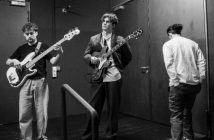Taking advantage of my free music student ticket – Turner Sims generously make ten available for nearly every concert they put on – I strolled down in good time to collect my freebie before settling in for the pre-concert talk at 7pm. The fact that I was in no way concerned about not securing my free ticket (there were in fact only three student attendees) points to the paradoxical state that Southampton’s Music department is in. Why is it that on a campus which lies only a 10-15 minute walk away from the majority of its students’ habitations, those very same students whose subject is so readily on display – on their doorstep and at zero cost – consistently prove that they have absolutely no interest in engaging with it? Having been a regular Turner Sims free-loader for two years now, it has continued to amaze me that their world-class classical concerts have drawn such indifference from the music students who stand to gain much – and lose nought – from simply turning up.
Snugly positioned in the classic interview formation, esteemed pianist Roger Vignoles and Turner Sims head-honcho Kevin Appleby began their enlightening discussion of the lieder of Hugo Wolf. It is worth mentioning that along with Hans Rott, Alexander von Zemlinsky, and Franz Schreker (to name but a few), Hugo Wolf is among the many maligned Austrian composers to have been eclipsed by the Austro-German giants. His music, whilst appreciated by the select musicological few, has rather tragically sunken into relative obscurity. It could be viewed as a miracle then, that not only do we get to hear some Wolf in an evening of lieder, but we get to hear only Wolf, and one complete song-cycle – the Italienisches Liederbuch (Italian Songbook) – at that.
Joining Vignoles on stage for the performance were rising-star soprano Elizabeth Watts and composer-baritone Roderick Williams. The rarely performed Italienisches Liederbuch presents a multitude of quirky characters, mostly spurned lovers, providing its performers with ample opportunity for both humour and pathos, and often intermingled within the same rispetto (an eight-line Tuscan poem). Watts and Williams didn’t disappoint: full of spritely joie de vivre in the lighter numbers; and a profound reverence in the weightier ones, a multi-faceted relationship of icy glares, coy giggles and warm smiles developed between the singers, welding a powerful emotional connection and cumulative quasi-narrative out of the individual songs of the Liederbuch. Although not linked by an overarching story, attempts have often been made to order the songs so that one emerges; such as in Dietrich Fischer-Dieskau, Elizabeth Schwarzkopf and Gerald Moore’s seminal 1960’s rendition. It was this approach that our present performers took, and a decision that left me in two minds about the result.
On the one hand there is an undeniable pleasure gleaned from hearing a serenade sung by a roguish lover up to his sweetheart’s window, followed swiftly by a lament from the girl, stuck as she is in bed with her mother and unable to enjoy her lover’s embrace. Grouped in a way that allows for such continuities to be drawn, one is able to enjoy immediate connections where before there were none. However, the pedantic purist within me cries out for order! If the composer numbered them in a specific way – which Wolf did – is it not then presumptuous to abandon that order in favour of one supposedly more logical? I couldn’t help but feel somewhat cheated by the re-ordering, sensitive to key-relationships as it was.
Another gripe which niggled at me throughout was that we hadn’t been provided with the full text, only a ‘paraphrase’ in the programme, as it was generously termed. Unable to understand the nuanced meaning behind each line – delivered as they were with such energy – the gaps in the paraphrase began to irritate me. Then again, as Vignoles pre-emptively pointed out, without swathes of text to rifle through one was more able to observe the singers’ countenance (expressive to the point of gross caricature in the case of Watts), not to mention the cacophony of page-rustling that would have ensued had we been replete with Paul Heyse’s fully collected text. It seems next time I’ll have to come armed with my own little print-off!
By turns delicate and gaudy, heart-breaking and hilarious, poignant and bizarre, the 46 songs – in the deft hands of Vignoles and Co. – shone with a brightness that makes one weep for Wolf’s predicament, and lament his relegation to the B-list ranks beneath those less imaginative song composers who continually dominate our programmes. If last night’s unique (and Turner Sims exclusive) concert is anything to go by, I’m hopeful we may yet see a resurgence of Wolf in the concert hall. Although I must admit I’m ultimately resigned, and with great melancholy, to his remaining the best-kept secret among the lieder-lovers of this world.
Wolf’s Italian Songbook was performed exclusively at the Turner Sims on the 24th November.



